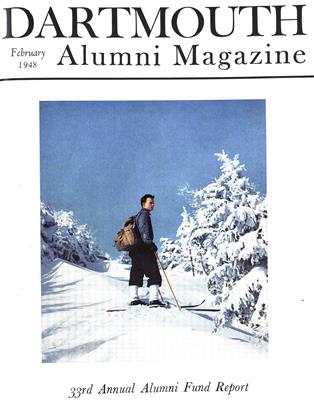by David Rousset;Translated and with an introduction byProf. Ramon Guthrie. Reynal & Hitchcock, 1947; pp. 17}, #2.75.
If this were merely another documented account of the horrors of the German concentration camps it would still be required reading for those who have already allowed themselves to forget what happened in Hitler Germany. Yet, it is more than this, much more. It is a sociological study of that "other kingdom" behind barbed wire and granite walls. The other kingdom was the "concentrationary universe," a society stripped to the bone but still a society, a self contained social organization with government, mores and privileged classes. It is this, not the beatings and deaths which make for the unique honor of the book since in it we see mirrored the world we live in—distorted to be sure—but not so distorted that we can pretend not to recognize it.
If we do not like what we find in, say, TheTrial by Kafka we may dismiss it as the nightmare of an unbalanced mind. But we cannot so dismiss The Other Kingdom. The author was in four different concentration camps and writes from his own experience. He is as objective as a scientist studying the habits of a primitive tribe. Indeed, so coldly objective is he that the reader feels like complaining at the want of emotions—that is until he realizes that for one who has lived through these events it is the only bearable way of treating them.
Professor Raymond Guthrie has made TheOther Kingdom available to English readers in a clear and intelligent translation and has provided it with a stimulating introduction that will be helpful to all readers of the book.
 View Full Issue
View Full Issue
More From This Issue
-
 Article
ArticleATOMIC ENERGY CONTROL
February 1948 By CHESTER I. BARNARD, -
 Class Notes
Class Notes1949
February 1948 -
 Class Notes
Class Notes1918
February 1948 By ERNEST H. EARLEY, DONALD L. BARR, DAVID L. GARRATT -
 Class Notes
Class Notes1935
February 1948 By H. REGINALD BANKART JR., FREDERICK T. HALEY, ROBERT W. NARAMORE -
 Class Notes
Class Notes1931
February 1948 By A. W. LAUGHTON, WILLIAM H. SCHULDENFREI, ERNEST H. MOORE -
 Class Notes
Class Notes1924
February 1948 By JAMES T. WHITE, RICHARD A. HENRY, DONALD E. COYLE
Vernon Hall JR.
-
 Books
BooksOF A HUNTER, NOW!
May 1945 By Vernon Hall Jr. -
 Books
BooksTHE NOBEL PRIZE TREASURY
July 1948 By Vernon Hall Jr. -
 Books
BooksTHE LANGUAGE OF NATURAL DESCRIPTION IN EIGHTEENTH-CENTURY POETRY,
June 1949 By Vernon Hall Jr. -
 Books
BooksQUEST FOR MYTH
December 1949 By Vernon Hall Jr. -
 Books
BooksTHE EXCURSION. A STUDY,
May 1950 By Vernon Hall Jr. -
 Books
BooksROMANCE IN THE MAKING: CHRETIEN DE TROYES AND THE EARLIEST FRENCH ROMANCES.
January 1955 By VERNON HALL JR.
Books
-
 Books
BooksThe Charm of Scandinavia
June, 1915 -
 Books
BooksMOSTLY MAMA.
JUNE 1972 By EDWARD M. POTOKER '53 -
 Books
BooksSEE IF HE WINS
December 1949 By Herbert F. West '22 -
 Books
BooksWORKSHOPS FOR THE WORLD.
February 1955 By JOHN G. GAZLEY -
 Books
BooksLOVE LIES BLEEDING.
MAY 1965 By RAYMOND BUCK '52 -
 Books
BooksNeither Ogres Nor Louts
APRIL 1982 By Thomas Vargish

